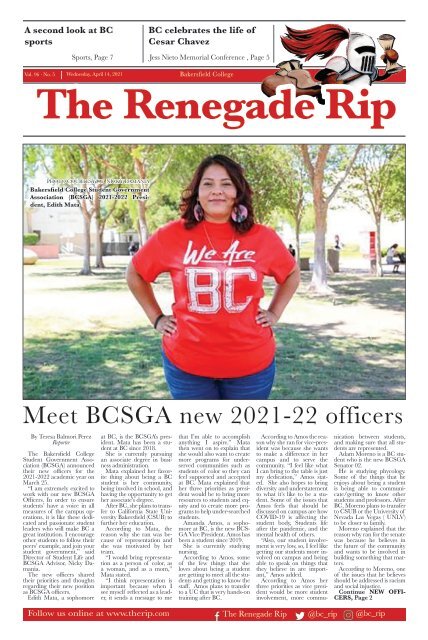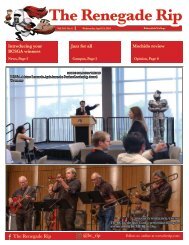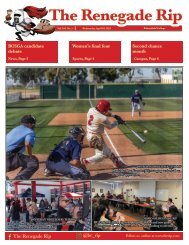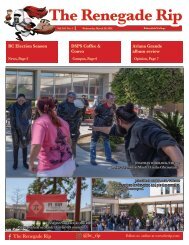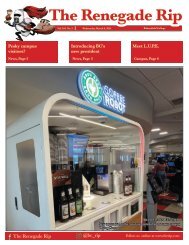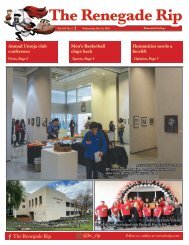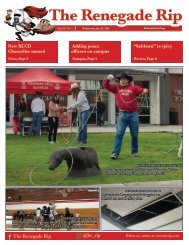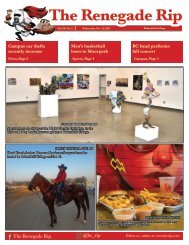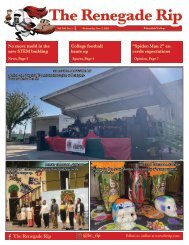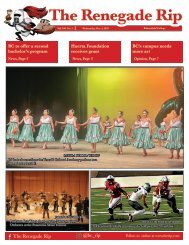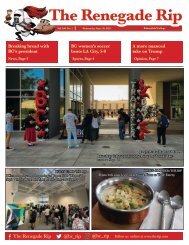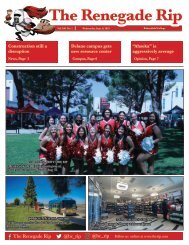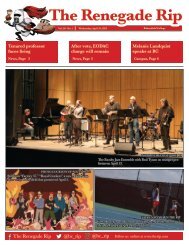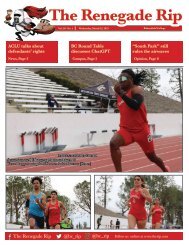Rip Issue 5, April 14, 2021
- No tags were found...
You also want an ePaper? Increase the reach of your titles
YUMPU automatically turns print PDFs into web optimized ePapers that Google loves.
A second look at BC<br />
sports<br />
Sports, Page 7<br />
BC celebrates the life of<br />
Cesar Chavez<br />
Jess Nieto Memorial Conference , Page 5<br />
Vol. 96 ∙ No. 5 Wednesday, <strong>April</strong> <strong>14</strong>, <strong>2021</strong> Bakersfield College<br />
The Renegade <strong>Rip</strong><br />
PHOTO COURTESY OF NICKY DAMANIA<br />
Bakersfield College Student Government<br />
Association (BCSGA) <strong>2021</strong>-2022 Presi-<br />
dent, Edith Mata.<br />
Meet BCSGA new <strong>2021</strong>-22 officers<br />
By Teresa Balmori Perez<br />
Reporter<br />
The Bakersfield College<br />
Student Government Association<br />
(BCSGA) announced<br />
their new officers for the<br />
<strong>2021</strong>-2022 academic year on<br />
March 25.<br />
“I am extremely excited to<br />
work with our new BCSGA<br />
Officers. In order to ensure<br />
students’ have a voice in all<br />
measures of the campus operations,<br />
it is like these dedicated<br />
and passionate student<br />
leaders who will make BC a<br />
great institution. I encourage<br />
other students to follow their<br />
peers’ example, and join your<br />
student government,” said<br />
Director of Student Life and<br />
BCSGA Advisor, Nicky Damania.<br />
The new officers shared<br />
their priorities and thoughts<br />
regarding their new position<br />
as BCSGA officers.<br />
Edith Mata, a sophomore<br />
at BC, is the BCSGA’s president.<br />
Mata has been a student<br />
at BC since 2018.<br />
She is currently pursuing<br />
an associate degree in business<br />
administration.<br />
Mata explained her favorite<br />
thing about being a BC<br />
student is her community,<br />
being involved in school, and<br />
having the opportunity to get<br />
her associate's degree.<br />
After BC, she plans to transfer<br />
to California State University<br />
Bakersfield (CSUB) to<br />
further her education.<br />
According to Mata, the<br />
reason why she ran was because<br />
of representation and<br />
she was motivated by her<br />
team.<br />
“I would bring representation<br />
as a person of color, as<br />
a woman, and as a mom,”<br />
Mata stated.<br />
“I think representation is<br />
important because when I<br />
see myself reflected as a leader,<br />
it sends a message to me<br />
that I’m able to accomplish<br />
anything I aspire.” Mata<br />
then went on to explain that<br />
she would also want to create<br />
more programs for underserved<br />
communities such as<br />
students of color so they can<br />
feel supported and accepted<br />
at BC. Mata explained that<br />
her three priorities as president<br />
would be to bring more<br />
resources to students and equity<br />
and to create more programs<br />
to help under-searched<br />
students.<br />
Amanda Amos, a sophomore<br />
at BC, is the new BCS-<br />
GA Vice President. Amos has<br />
been a student since 2019.<br />
She is currently studying<br />
nursing.<br />
According to Amos, some<br />
of the few things that she<br />
loves about being a student<br />
are getting to meet all the students<br />
and getting to know the<br />
staff. Amos plans to transfer<br />
to a UC that is very hands-on<br />
training after BC.<br />
According to Amos the reason<br />
why she ran for vice-president<br />
was because she wants<br />
to make a difference in her<br />
campus and to serve the<br />
community. “I feel like what<br />
I can bring to the table is just<br />
my dedication,” Amos stated.<br />
She also hopes to bring<br />
diversity and understatement<br />
to what it’s like to be a student.<br />
Some of the issues that<br />
Amos feels that should be<br />
discussed on campus are how<br />
COVID-19 is affecting the<br />
student body, Students life<br />
after the pandemic, and the<br />
mental health of others.<br />
“Also, our student involvement<br />
is very low, so, I feel like<br />
getting our students more involved<br />
on campus and being<br />
able to speak on things that<br />
they believe in are important,”<br />
Amos added.<br />
According to Amos her<br />
three priorities as vice president<br />
would be more student<br />
involvement, more communication<br />
between students,<br />
and making sure that all students<br />
are represented.<br />
Adam Moreno is a BC student<br />
who is the new BCSGA<br />
Senator 02.<br />
He is studying phycology.<br />
Some of the things that he<br />
enjoys about being a student<br />
is being able to communicate/getting<br />
to know other<br />
students and professors. After<br />
BC, Moreno plans to transfer<br />
to CSUB or the University of<br />
Nevada Las Vegas ( UNLV)<br />
to be closer to family.<br />
Moreno explained that the<br />
reason why ran for the senate<br />
was because he believes in<br />
the future of the community<br />
and wants to be involved in<br />
building something that matters.<br />
According to Moreno, one<br />
of the issues that he believes<br />
should be addressed is racism<br />
and social injustice.<br />
Continue NEW OFFI-<br />
CERS, Page 2<br />
Follow us online at www.therip.com<br />
The Renegade <strong>Rip</strong><br />
@bc_rip<br />
@bc_rip
News<br />
Page 2<br />
The Renegade <strong>Rip</strong> www.therip.com Wednesday, <strong>April</strong> <strong>14</strong>, <strong>2021</strong><br />
BC process of returning to campus<br />
By Charr Davenport and<br />
Brisa Flores<br />
Reporters<br />
Bakersfield College’s President<br />
Sonya Christian held<br />
two virtual forum seminars<br />
to discuss the topic of reopening<br />
BC campuses for<br />
the upcoming summer and<br />
fall semesters on <strong>April</strong> 6 and<br />
<strong>April</strong> 8.<br />
The President’s Virtual<br />
Seminars was hosted by Bakersfield<br />
College Director of<br />
Student Life Nicky Damania<br />
and featured President Christian<br />
as the main speaker.<br />
In the first seminar BC<br />
faculty members of BC that<br />
are a part of the campus’s instructional<br />
workgroup at BC<br />
shared their thoughts on the<br />
campus reopening.<br />
President Christian then<br />
introduced the panelists of<br />
the webinar; Rich McCrow<br />
BC’s Dean of Instruction;<br />
Joe Saldivar, the department<br />
chair of biology; Rony Recinos,<br />
an automotive technology<br />
professor; Jordan Rude, a<br />
professor of psychology; and<br />
Christie Howell, who is also a<br />
professor of psychology.<br />
“It’s certainly exciting as we<br />
start trucking towards some<br />
changes again in our life, like<br />
coming back together,” said<br />
McCrow and shared details<br />
about the coming fall <strong>2021</strong><br />
semester.<br />
McCrow shared that just<br />
like the changes at BC at the<br />
beginning of the pandemic,<br />
such as management, it will<br />
continue to change to adjust<br />
to the “new normal.”<br />
McCrow then went on and<br />
had a Q&A session with the<br />
rest of the panelists to share<br />
their reopening thoughts.<br />
Recinos was asked to share<br />
his opinion on what the new<br />
normal would look like when<br />
faculty and students return to<br />
campus.<br />
Recinos said the engineering<br />
department had laid<br />
some expectations for students,<br />
such as requiring face<br />
masks, washing their hands,<br />
and scanning the BC pass<br />
app QR code.<br />
“Don’t be scared of coming<br />
back. It’s fun,” added Recinos.<br />
The next question was directed<br />
towards Howell. She<br />
was asked what are some<br />
ideas faculty would use to<br />
help ease the anxiety and fear<br />
students could have when returning<br />
to campus.<br />
Howell said that talking to<br />
the students like regular people<br />
is essential for easing that<br />
anxiety to let them know that<br />
faculty is there for them.<br />
Saldivar was asked what<br />
the difficulties students are<br />
that they face when it comes<br />
to communicating. “I can’t<br />
wait to go back to the classroom,”<br />
he shared.<br />
Saldivar added that building<br />
relationships with students<br />
happens in their lab<br />
time in a science course. Not<br />
being able to do labs physically<br />
is like a “punch in the<br />
gut.”<br />
Rude was asked how personal<br />
challenges would<br />
impact the capacity of empathizing<br />
with students.<br />
Rude said that being transparent<br />
with his students was<br />
helpful and shared ideas on<br />
how he centered himself before<br />
he could center his students.<br />
Rude added that he created<br />
a discussion post for his students<br />
to discuss a new hobby<br />
they picked up and share<br />
their progress with their<br />
classmates.<br />
“Do something and have<br />
a plan for yourself and if it<br />
works, share it with your students,”<br />
shared Rude.<br />
The webinar ended with<br />
McCrow telling the rest of<br />
the panelists to share their final<br />
expectations and thoughts<br />
on returning to campus.<br />
The second seminar featured<br />
Interim Director of the<br />
Student Health and Wellness<br />
Center Cindy Collier,<br />
Director of Counseling and<br />
Student Success Marisa Marquez,<br />
nursing professor Lisa<br />
Harding, and nursing student<br />
Abigail Greenleaf-Poncho as<br />
guest speakers.<br />
The virtual forum opened<br />
with a slide show presented<br />
by President Christian which<br />
detailed current COVID-19<br />
statistics as well as future<br />
COVID-19 campus safety<br />
protocols. As of <strong>April</strong> 8,<br />
there have been 106,724<br />
COVID-19 resident cases in<br />
Kern County, with 38,232<br />
recoveries and 1,298 deaths.<br />
Kern County currently remains<br />
in the Red Tier, but is<br />
expected to be in the Orange<br />
Tier before June 15, according<br />
to an article by Ilyana Capellan<br />
written for KGET.<br />
“Right now, 21 million<br />
Californians have had one<br />
or two doses of the Pfrizer or<br />
the Moderna vaccine, or one<br />
dose of the Johnson & Johnson,”<br />
said President Christian.<br />
“In Kern County, we have<br />
over 300,000 individuals that<br />
had a dose, so the numbers<br />
are looking really promising.”<br />
President Christian’s vaccine<br />
information can be proven<br />
true by an interactive California<br />
COVID-19 vaccine<br />
tracker provided by ABC 7<br />
News on their website.<br />
President Christian also announced<br />
the arrival of 1,000<br />
Johnson & Johnson vaccines<br />
as well as a vaccine drive-thru<br />
held on <strong>April</strong> 10 from 10<br />
a.m. until 5 p.m. at the Bakersfield<br />
College Panorama<br />
campus. Bakersfield College<br />
is also providing second doses<br />
of the Moderna vaccine<br />
at the Panorama campus on<br />
<strong>April</strong> 10, the Arvin campus<br />
on <strong>April</strong> 11, and the Delano<br />
campus on <strong>April</strong> 12.<br />
Following the announcement<br />
of the vaccines and<br />
vaccine drive-thrus was the<br />
discussion of campus safety<br />
during the COVID-19 epidemic.<br />
“Above and beyond, our<br />
priority is the health and safety<br />
of our students and anyone<br />
that comes on campus,”<br />
said Damania. “It’s business<br />
unusual and we’re doing<br />
what we can to make sure it’s<br />
a proper and exciting time to<br />
come back to campus.”<br />
Guest speaker Collier also<br />
had some positive words<br />
about the return to campus<br />
and Bakersfield College’s<br />
current COVID-19 safety<br />
protocols, which include social<br />
distancing and using a<br />
campus pass app that screens<br />
for COVID-19 symptoms. “I<br />
want to make sure that everybody<br />
understands that Bakersfield<br />
College has done an<br />
outstanding job with preventing<br />
the spread of COVID-19<br />
on our campus,” she said.<br />
“I am really, really proud to<br />
say that all the year that we<br />
have been on campus, we haven’t<br />
had one confirmed case<br />
of COVID-19 transmission,<br />
meaning our safety protocols<br />
have been working and will<br />
continue to work to keep everybody<br />
safe.”<br />
Currently Bakersfield College<br />
has a four stage plan for<br />
the return to campus, with<br />
administration members returning<br />
to campus first on<br />
<strong>April</strong> 19, program directors<br />
and managers returning on<br />
May 3, classified staff members<br />
returning on May 17,<br />
and normal faculty returning<br />
on June 1.<br />
Students are expected to<br />
make a return to Bakersfield<br />
College on June <strong>14</strong>.<br />
NEW OFFICERS: Edith Mata<br />
Continued from Page 1<br />
“We turn on the news or we go on Twitter and<br />
we learn about something terrible that’s happened,<br />
and we’re reminded of the reality of racism and<br />
social injustices everywhere,” Moreno said. His<br />
three priorities would be culture, safety, and social<br />
justice for students.<br />
“Safety and social justice go hand and hand because<br />
when we work hard to set a new standard for<br />
justice, students will feel safer.”<br />
Jordan Amey is a freshman at BC and is the new<br />
BCSGA Senator 02. He is a phycology major.<br />
According to Amey some of the things he enjoys<br />
about BC are the extracurricular and resources<br />
that are provided and he also enjoys the staff.<br />
Amey plans to transfer to the University of California<br />
Los Angeles (UCLA) and possibly go to grad<br />
school to further his studies into becoming a phycologist.<br />
Amey stated that one of the issues that should be<br />
addressed are the problems surrounding the lack<br />
of student engagement and students' wellbeing.<br />
“Although I've only been at BC for less than a<br />
year, I find that there's no engagement from the<br />
student body, primarily within BC's clubs and associations,”<br />
Amey stated.<br />
As for the well-being of other students, he feels<br />
that it’s hard to exactly know how students are<br />
dealing with the pandemic because of the campus<br />
being closed but he hopes that there is a way to<br />
create more services for students.<br />
According to Amey his three priorities as senator<br />
would be to have communication within the<br />
student body, to work with other members of the<br />
BCSGA in order to come up with more fundings,<br />
and to create more student services.<br />
First place nationally for two year college Websites at<br />
the Associated Collegiate Press 2020 midwinter conference.<br />
Fifth place newspapers. First place for newspaper<br />
in 2011, third place in 2013, 20<strong>14</strong>, 2015 for CNPA General<br />
Excellence<br />
Fourth place nationally in 2019 for website publication<br />
by Associated Collegiate Press<br />
The Renegade <strong>Rip</strong> is produced by Bakersfield College<br />
journalism classes and is circulated on Thursdays<br />
during the fall and spring semesters. The newspaper is<br />
published under the auspices of the Kern Community<br />
College District Board of Trustees, but sole responsibility<br />
for its content rests with student editors. The <strong>Rip</strong> is<br />
a member of the California Newspaper Publishers Association,<br />
Associated Collegiate Press, and California<br />
Colleges Media Association.<br />
The Renegade <strong>Rip</strong><br />
EDITORIAL BOARD<br />
Editor-in-Chief.........................Haley Duval<br />
Digital Editor........Hugo Maldonado Garcia<br />
News Editor......................... Amaya Lawton<br />
Features Editor.............Sydney Mcclanahan<br />
Opinions Editor....................Victoria Meza<br />
Editor......................................Nick Covello<br />
Copy Editor...........................Joselyn Green<br />
Adviser.........................................Erin Auerbach<br />
STAFF<br />
Reporters/photographers:<br />
Teresa Balmori Perez, Jaylene<br />
Collins, Charr Davenport, Alexis<br />
Delgadillo, Brisa Flores, Clarecca<br />
Hargis, Saioa Laverty, Razan<br />
Makhlouf, Aubrianna Martinez,<br />
Angeles Mendez<br />
Write The <strong>Rip</strong><br />
Letters should not exceed 300 words,<br />
must be accompanied by a signature<br />
and the letter writer’s identity must be<br />
verified.<br />
The <strong>Rip</strong> reserves the right to edit<br />
letters, however, writers will be given the<br />
opportunity to revise lengthy or unacceptable<br />
submissions.<br />
If an organization submits a letter as a<br />
group, it must be signed by only one person,<br />
either the leader of the organization<br />
or the letter writer. Anonymous letters<br />
will not be published.<br />
How to reach us<br />
-Address: Bakersfield College,<br />
1801 Panorama Drive, Bakersfield,<br />
CA 93305<br />
-Phone: (661) 395-4324<br />
-Email: ripmail@bakersfieldcollege.edu<br />
-Website: therip.com
News<br />
Page 3<br />
The Renegade <strong>Rip</strong> www.therip.com Wednesday, <strong>April</strong> <strong>14</strong>, <strong>2021</strong><br />
CCC chancellor updates on reopening<br />
By Clarecca Hargis<br />
Reporter<br />
The California community colleges chancellor’s<br />
office held an open webinar discussing student media<br />
on March 25. The teleconference was hosted<br />
by chancellor Eloy Oakley who talked about financial<br />
aid, vaccines for students, reopening procedures,<br />
and support getting students back on<br />
campus across California.<br />
Oakley explained the 20 million dollar outreach<br />
bill that was passed by President Joe Biden. The<br />
bill will help colleges receive proper funding to reopen<br />
in the coming months as well as reach out to<br />
students who may have left college due to the pandemic.<br />
Oakley said that it was a priority to reopen<br />
schools with the intent of proper maintenance for<br />
the health and safety of students and staff. He said<br />
that college classes will not be at max capacity and<br />
social distancing will still be mandated. Oakley said<br />
that fall semester classes including labs and other<br />
career programs that require hands-on training<br />
will have smaller class sizes. As for other lecture<br />
classes, hybrid classes will be in effect.<br />
Oakley discussed financial aid opportunities to<br />
help students to get back on campus. He explained<br />
that it is not too late for students to contact their<br />
colleges to possibly receive financial aid for the<br />
upcoming semester. Students should contact their<br />
college’s financial aid office for more questions as<br />
well as visit the icanaffordcollege.com website.<br />
The chancellor also spoke about the anti-Asian<br />
violence that has been increasing across the state<br />
and country.<br />
“We do not tolerate anti-Asian violence in any<br />
shape or form and we must protect Asian and Pacific<br />
islanders on our campus,” Oakley said. He<br />
wants all campuses to come together to protect the<br />
Asian community.<br />
Oakley explained that there is a light at the end<br />
of the tunnel with the amount of COVID-19 vaccines<br />
available to the public as well as a decrease in<br />
the number of people affected by the virus. He said<br />
that the vaccine is starting to be available for college<br />
students and Los Angeles County is planning<br />
for reopening by <strong>April</strong> 15. Oakley said that the<br />
facility and staff at California community colleges<br />
have begun vaccinations and would also like to see<br />
students vaccinate as well. According to him, with<br />
the majority of those vaccinated, the reopening of<br />
college campuses will be a lot smoother. However,<br />
campuses must follow and maintain CDC guidelines<br />
to reopen. Oakley explained that if students<br />
wanted more information on where they can get<br />
their vaccine, they can visit myturn.california.gov.<br />
According to Oakley, although many Californians<br />
are getting the vaccination, campuses must<br />
continue to follow CDC guidelines. Some members<br />
of the Senate are not wearing masks anymore<br />
because they are fully vaccinated. Oakley said that<br />
CLARECCA HARGIS / THE RIP<br />
California Community Colleges hosted a<br />
webinar for a student media teleconference,<br />
hosted by chancellor Eloy Oakley.<br />
regardless of the Senate’s choices to mask up or<br />
not, students must continue to mask up until there<br />
is enough immunity in our communities towards<br />
the virus. Oakley encouraged students and people<br />
to continue to follow the guidelines and mask up.<br />
The next teleconference is set for this May to discuss<br />
reopening procedures for California community<br />
colleges for students and staff.<br />
INDA transfer guide<br />
WHAM on the vaccine<br />
By Brisa Flores<br />
Reporter<br />
The Bakersfield College Industrial<br />
Automation Department<br />
held a webinar to give<br />
future students information<br />
about the four year degree program<br />
on March 25.<br />
This webinar explained the<br />
program, such as what prospective<br />
students will learn and the<br />
program’s required courses.<br />
Panelists in this webinar were<br />
some of the professors in the<br />
engineering and systems department<br />
at BC; Maryam Farahani,<br />
who teaches transferable engineering<br />
courses at BC; and Roy<br />
Allard, who is also a professor in<br />
the engineering and systems department<br />
at BC.<br />
Jason Dixon, the department<br />
chair for the engineering and<br />
system department and faculty<br />
leader for the industrial automation<br />
program, gave a presentation<br />
on the requirements for this<br />
program for students who plan<br />
to transfer to BC.<br />
The BC website defines industrial<br />
automation as “interconnected<br />
equipment, technology,<br />
and systems working together<br />
to maximize production, assure<br />
safety, use resources efficiently,<br />
and ensure product quality.”<br />
To start, Dixon gave a brief<br />
overview of the skills a student<br />
acquires in this program.<br />
“There’s an equal balance<br />
of technical and management<br />
skills,” and added that these are<br />
skills a lot of companies look for<br />
when hiring. There are various<br />
career options for students after<br />
they graduate; some said in the<br />
presentation were project manager,<br />
field service engineer, safety<br />
& health engineer, etcetera.<br />
Dixon stated that there is a<br />
very active and involved industrial<br />
advisory board.<br />
There are guest speakers from<br />
companies like Target, Bolthouse<br />
Farms, Chevron, and<br />
even local companies like Kern<br />
Steel in some courses. Students<br />
in the program can even get<br />
internships or jobs in said companies<br />
during or after they have<br />
graduated.<br />
Dixon added that the engineering<br />
department is currently<br />
partnering with companies moving<br />
into the county to help create<br />
internships for students.<br />
Dixon discussed the courses<br />
students need to take in both<br />
lower and upper-division requirements<br />
to fulfill degree requirements.<br />
There are prerequisites that<br />
students must take before applying<br />
to the program, such as<br />
English 1A. Courses like a communication<br />
course and technical<br />
writing are one of the many required<br />
courses.<br />
All the required courses and<br />
views of the degree plan are on<br />
the industrial automation site on<br />
BC’s website.<br />
A counselor would be available<br />
to help students figure out<br />
their course plan and make sure<br />
they are on the right track to<br />
graduate.<br />
Dixon also added that if students<br />
have not completed some<br />
of the lower division courses or<br />
prerequisites, they may complete<br />
those courses at BC.<br />
Dixon also covered this program’s<br />
cost. Each unit in all<br />
California community courses<br />
is around 46.00$, and each class<br />
is around 128.00$. Dixon added<br />
that there is financial aid available<br />
for those who qualify to<br />
cover costs.<br />
The last day to register and<br />
submit an application for Upper<br />
Division is May 15.<br />
By Razan Makhlouf<br />
Reporter<br />
Bakersfield College Latinas Unidos<br />
hosted a virtual dialogue called “A Dialogue<br />
About COVID-19: The Vaccine &<br />
Your Health” on March 24.<br />
The event was put together by the Bakersfield<br />
College Women’s History and<br />
More (WHAM), and the Office of Student<br />
Life at Bakersfield College.<br />
The dialogue was organized by Olivia<br />
Garcia, professor of history at Bakersfield<br />
College. The panelists were Michelle<br />
Corson, the Program Manager/Public<br />
Relations Officer for the Kern County<br />
Public Health Services Department,<br />
Connie Perez-Andreesen, the Chief<br />
Administrative Officer for United Farm<br />
Workers, Jay Tamsi, Co-Founder of the<br />
Latino Covid-19 Task Force and President/CEO<br />
of the Kern County Hispanic<br />
Chamber of Commerce, as well as Bianca<br />
Torres, the Hotline Manager of the<br />
Kern County Latino COVID-19 Taskforce<br />
Hotline. The themes covered in the<br />
dialogue were: Latino COVID-19 Task<br />
Force, Public Health vaccine, COVID-19<br />
and Mental Health Hotline, and your<br />
Physical Health; Farmworker Outreach;<br />
and Women-specific Health Impact.<br />
First, the panelists were asked about<br />
how COVID-19 impacted the work they<br />
do within the organizations they serve.<br />
Tamsi explained how they had to learn<br />
new techniques to get by. “We had to shift<br />
direction and help our community. If we<br />
did not help the community, and we did<br />
not focus on outreach, awareness, and<br />
campaigns, our Latino community would<br />
not understand what was going on, and<br />
how serious it was. So, we completely<br />
shifted,” Tamsi said.<br />
Corson talked about how they worked<br />
hard on providing the most accurate information<br />
to the public. “The goal of<br />
public health is to protect the health and<br />
slow the spread of any communicable<br />
disease which COVID-19 is. That is why<br />
we literally dropped everything. Every<br />
employee in all our divisions their jobs<br />
changed immediately to COVID–related<br />
duties,” Corson said.<br />
“Our world was turned upside down<br />
when this happened in March. We immediately<br />
shifted our priorities to wanting to<br />
protect our staff but also our farmworkers.<br />
When we were forced to work from<br />
home it was a seamless transition because<br />
the staff was trained to do everything<br />
without using tons of paper,” Perez-Andreesen<br />
said. Then, the panelists were<br />
asked about their thoughts about which<br />
vaccine to take; Johnson & Johnson,<br />
Moderna, or Pfizer.<br />
The panelists explained the importance<br />
of getting the COVID-19 vaccines for<br />
immunity regardless of the brand. “Protection<br />
is protection, and if Pfizer is available<br />
then go get that one. If Moderna is<br />
available get that one, and if Johnson &<br />
Johnson is available then go get that one<br />
because you’re going to be protected with<br />
all three,” Torres said.<br />
They also were surprised about how<br />
popular Johnson & Johnson vaccine is<br />
when they thought people would reject it<br />
because it has a lower effectiveness rate<br />
in comparison to Pfizer and Moderna.<br />
“Johnson & Johnson is one dose and convenient<br />
for a lot of folks,” Corson said.<br />
The panelists were also asked to explain<br />
if the vaccines have side effects.<br />
Torres explained that body aches are<br />
normal symptoms of COVID-19. “Once<br />
you get vaccinated, you’re introducing<br />
your body into a forged object basically,<br />
and so your body’s first response is to fight<br />
and when your body is fighting it means<br />
you are getting fevers, chills, all flu–like<br />
symptoms and that is why you may have<br />
symptoms afterward,” Torres said. The<br />
last question was whether the panelists<br />
encountered common myths in regards<br />
to the vaccine. “We have been hearing<br />
that the vaccine has a chip. It’s a tracking<br />
device or that it’s going to leave a devil’s<br />
mark,” Perez-Andreesen said.<br />
Tamsi said that the biggest myth he<br />
heard is that the future children of vaccinated<br />
parents will have autism.<br />
Michelle added that some people think<br />
that COVID-19 is fake, and masks don’t<br />
work.
Features<br />
Page 4<br />
The Renegade <strong>Rip</strong> www.therip.com<br />
Wednesday, <strong>April</strong> <strong>14</strong>, <strong>2021</strong><br />
My Rainbow Road:<br />
Donnée Patrese Harris<br />
on her writing journey<br />
By Charr Davenport<br />
Reporter<br />
The Bakersfield College Sexuality and Gender<br />
Acceptance (SAGA) Club held the tenth session<br />
of their weekly My Rainbow Road: Stories of the<br />
LGBTQ+ Success from Our Community Zoom<br />
speaker series on <strong>April</strong> 7. The guest speaker for<br />
the event was Donnée Patrese Harris, an erotic<br />
romance novelist and the Vice President of Writers<br />
of Kern, which is a branch of the California Writers<br />
Club.<br />
The event opened with a short introduction of<br />
Harris, given by the event host and Bakersfield<br />
College Communication Department Chair Helen<br />
Acosta, who had met Harris at the first Bakersfield<br />
Pride march in 2017. “Donnée is a person who<br />
always inspires me because she is passionate and<br />
driven,” said Acosta before giving the platform to<br />
Harris.<br />
“I find that I can’t talk about my journey without<br />
talking about my writing journey,” opened Harris.<br />
“Most writers know that authenticity is the key to<br />
writing a book… In order for that to happen, you<br />
have to be authentic with yourself.”<br />
She proceeded to explain the five-year process<br />
of writing her first and most successful novel,<br />
“Prohibited.” Harris had spent the first two to three<br />
years of the five-year writing process creating the<br />
first draft, after which she had a close friend and<br />
her husband beta read it. Much to her dismay, they<br />
both hated it because of its lack of authenticity. “I<br />
realized later on that of course my characters were<br />
fake,” said Harris. “Of course my story wasn’t real.<br />
Because I wasn’t being real with myself.”<br />
Harris then proceeded to explain how she was<br />
considered the black sheep of her family because<br />
What should our professors<br />
know? BC students speak<br />
By Clarecca Hargis<br />
Reporter<br />
BC presented a webinar discussing student<br />
experiences on March 24. A large audience of<br />
nearly 90 people joined the discussion. Student<br />
body leaders shared their personal experiences on<br />
campus and in the classroom. Their experiences<br />
included how teachers made them feel with the<br />
material they teach as well as feeling included.<br />
Dr. Paula Parks, who teaches English at BC and<br />
is the Umoja community ASTEP coordinator,<br />
provided an example of a discussion about a<br />
restroom scenario to show disparity in equity.<br />
At a baseball game, there were more available<br />
restrooms for men, but there were long lines to use<br />
the restroom for women. One group was catered<br />
to and taken care of more than the other for the<br />
same sports game.<br />
William Guillen is apart of the BC SAGA club<br />
who refers to himself as a queer person of color.<br />
He explained how representation matters in the<br />
classroom and how we are currently in a time of<br />
transition. Guillen said that not everyone at BC is<br />
living a heterosexual life. He shared his experience<br />
while enrolled in a theater class at Bakersfield<br />
College and how he had a cisgender white male<br />
professor who was instructing the course. He<br />
referenced that the professor did not include<br />
material from artists who are people of color or<br />
she was considered smart, obedient, and sensitive.<br />
This lead to her yearning for acceptance and<br />
letting other people decide who she was. “I let<br />
other people define me, which of course made me<br />
miserable.”<br />
Once Harris was able to accept herself for who<br />
she was, she was able to rewrite and complete her<br />
novel.<br />
Though to the surprise of herself and eventually<br />
her family, it became an erotic romance novel. At<br />
the same time, Harris had also accepted herself as<br />
a bisexual woman. “First I came out to my family<br />
as an erotic romance writer and they freaked<br />
out,” said Harris before talking about her family’s<br />
negative reaction. “After that, it made it so much<br />
easier to come out as bisexual.”<br />
That isn’t to say that the reaction to her bisexuality<br />
wasn’t negative as well. “I had some blowback for<br />
both. For the book and for being bisexual. It was<br />
tough, but I persevered.”<br />
Harris ended her speech with advice for success.<br />
“The key was authenticity. In my writing and in<br />
my life,” she said. “Be authentic. Be who you truly<br />
are. Brush all that fake stuff off you and you can be<br />
successful.”<br />
LGBTQ. Guillen explained that he brought up<br />
Tyler Perry, a well-known Black theatre performer,<br />
and director. Guillen said that the professor had<br />
little to no interest in Perry and solely focused<br />
on material from white writers like William<br />
Shakespeare. Guillen said that he ended up<br />
dropping the class, and his decision was due to the<br />
lack of representation from multiple backgrounds<br />
and that the classroom was not inclusive.<br />
Zariyah Hall is on the membership chair of<br />
Bakersfield College’s Umoja club. She explained<br />
that some professors fail to include contributions<br />
from people of color in their educational planner.<br />
“People of color have contributed in science,<br />
math, as well as other subjects… I want to feel<br />
included.” Hall said. Hall added that Umoja classes<br />
not only include material from persons of colored<br />
backgrounds but are also inclusive of material from<br />
the LGBTQ community.<br />
Alexis Brown is a peer mentor for the Umoja<br />
club and spoke about her experiences as a student<br />
at Bakersfield College and how she encountered<br />
difficulties printing out her assignments for her<br />
classes. She explained that one of her professors<br />
gave her permission to print out her assignments<br />
from their classroom. However, another facility<br />
member told Brown she was not allowed to print<br />
and she would need to find another way to print<br />
out her assignments. According to Brown, she<br />
was denied access to print because she is a woman<br />
Renegade Events<br />
Campus Events<br />
<strong>April</strong> <strong>14</strong>: Open registration begins for Summer/Fall<br />
<strong>2021</strong>.<br />
<strong>April</strong> <strong>14</strong>: Fire & EMS virtual employer panel<br />
from 2 p.m. to 3:30 p.m. on Zoom.<br />
<strong>April</strong> <strong>14</strong>: Renegade Fitness from 12 p.m. to 1<br />
p.m. on Zoom.<br />
<strong>April</strong> 15: Guest Speaker Barry Scheck from 10<br />
a.m. to 11 a.m. and 6 p.m. to 7 p.m. on Zoom and<br />
BCSGA Facebook.<br />
<strong>April</strong> 16: CPR, AED, and First Aid Certification<br />
courses from 8 a.m to 5 p.m. in Performing<br />
Arts Center room 101.<br />
Apr. 19: Renegade Fitness from 12 p.m. to 1<br />
p.m. on Zoom.<br />
<strong>April</strong> 21: Public health career exploration<br />
event from 10 a.m. to 11:30 a.m. on Zoom.<br />
<strong>April</strong> 21: Law enforcement virtual employer<br />
panel frin 2 p.m. to 3:30 p.m. on Zoom.<br />
<strong>April</strong> 23: Renegade Fitness from 12 p.m. to 1<br />
p.m. on Zoom.<br />
<strong>April</strong> 26: Renegade Fitness from 12 p.m. to 1<br />
p.m. on Zoom.<br />
<strong>April</strong> 29: <strong>2021</strong> Honors celebration from 6 p.m.<br />
to 7 p.m. on BC Facebook and YouTube.<br />
<strong>April</strong> 29: Renegade Fitness from 12 p.m. to 1<br />
p.m. on Zoom.<br />
<strong>April</strong> 30: <strong>2021</strong> Honors medal drive-thru event<br />
from 10 a.m. to 1 p.m. at the BC admin circle/<br />
roundabout<br />
May 1: Renegade Fitness from 12 p.m. to 1<br />
p.m. on Zoom.<br />
May 8: Final Exams begin.<br />
May <strong>14</strong>: CPR, AED & first aid certification<br />
courses in Performing Arts Center room 101.<br />
May <strong>14</strong>: Final Exams end.<br />
May <strong>14</strong>: Last day to file for Spring <strong>2021</strong> graduation.<br />
May <strong>14</strong>: Commencement <strong>2021</strong>.<br />
of color. She explained that there were several<br />
white students that were allowed to print in those<br />
facilities, and they could get access but she could<br />
not, to resources she needed to succeed.<br />
Edith Mata is the president of Latinos Unidos<br />
por Educacion (LUPE) who discussed that<br />
there needs to be more support on campus. She<br />
explained that possibly hiring more counselors<br />
will help students succeed at BC. Mata explained<br />
how she is not a person of privilege and having<br />
internet access to complete her assignments can<br />
be difficult. She also added that some students<br />
face issues with transportation getting to and from<br />
campus. She would like to see Bakersfield College<br />
create more programs for students who are less<br />
privileged. Mata also explained how she would like<br />
to see more professors of color teaching on campus<br />
so that students can feel there is a larger diversity<br />
amongst those who teach.<br />
Cara Polte is a BC student-athlete and is a former<br />
Frontier High student who comes from a privileged<br />
background. She explained that her previous<br />
campus was not as diversified as Bakersfield<br />
College. Polte talked about how there are many<br />
differences in teachings amongst the schools and<br />
how she enjoys a more diversified environment.<br />
She concluded by saying that history classes in our<br />
society are very “whitewashed” and how schools<br />
should implement more ethnic background studies.<br />
This would allow students to have a greater idea of<br />
the world around them besides the norm that they<br />
are surrounded by.<br />
The hour-long discussion ended with a Q&A<br />
section where students were able to ask members<br />
more about their experiences.
Jess Nieto Memorial Conference<br />
Page 5<br />
The Renegade <strong>Rip</strong> www.therip.com<br />
Wednesday, <strong>April</strong> <strong>14</strong>, <strong>2021</strong><br />
Bakersfield College celebrates the<br />
life and legacy of Cesar Chavez<br />
By Charr Davenport<br />
Reporter<br />
The Bakersfield College Social Justice<br />
Institute and the United Farm<br />
Workers of America (UFW) teamed<br />
together to put on Celebrating the<br />
Legacy of Cesar Chavez, the Farmworker<br />
Movement, and the Ongoing<br />
Work of the UFW and Cesar Chavez<br />
Foundation, a Zoom panel, on Tuesday,<br />
March 23 as part of the second<br />
day of the third annual Jess Nieto<br />
Memorial Conference.<br />
According to the Bakersfield College<br />
Social Justice Institute’s webpage,<br />
the Jess Nieto Memorial Conference<br />
is a yearly conference held in the<br />
memory of Chicano Studies Professor<br />
Jesus “Jess” Gilberto Nieto that focuses<br />
on “Chicano/a/x, Latino/a/x,<br />
and regional cultures and histories,<br />
Ethnic Studies, community service<br />
and activism, pedagogical practices,<br />
and student thought and identity.”<br />
The event ran from Monday, March<br />
22 until Friday, March 26.<br />
The Zoom panel Celebrating the<br />
Legacy of Cesar Chavez, the Farmworker<br />
Movement, and the Ongoing<br />
Work of the UFW and Cesar Chavez<br />
Foundation, focused on the historic<br />
Delano Grape Strike, Cesar Chavez’s<br />
work with the UFW, Chavez’s memory,<br />
and the legacy that the UFW carries<br />
today.<br />
CHARR DAVENPORT / THE RIP<br />
Paul Chavez, son of Cesar Chavez and president of the Cesar<br />
Chavez Foundation, talks about his father’s legacy during the<br />
panel.<br />
The event was hosted and moderated<br />
by Eric Cardona and Bakersfield<br />
College History Professor, Olivia<br />
Garcia.<br />
Panelists featured were son of Cesar<br />
Chavez and President of the Cesar<br />
Chavez Foundation Paul Chavez,<br />
current President of the UFW Teresa<br />
Romero, former President of the<br />
UFW Arturo Rodriguez, and Captain<br />
of the Delano Grape March- a<br />
300-mile march from Delano to Sacramento-<br />
Roberto “El Capitan” Bustos.<br />
Three of the four panelists had<br />
known Cesar Chavez personally before<br />
his death in 1993, Rodriguez and<br />
Bustos working alongside him and<br />
Paul Chavez being his son.<br />
“We are a labor organization, but<br />
when Cesar founded us, we always<br />
had this idea that we would be more<br />
than a union,” said Rodriguez about<br />
the UFW.<br />
According to the UFW’s official<br />
website, the UFW was founded in<br />
1962 by Cesar Chavez, Delores<br />
Huerta, Gilbert Padilla, and others<br />
that are unnamed. While the main<br />
focus of the UFW is to unionize<br />
farmworkers, other goals involve education,<br />
health benefits, and anti-discrimination<br />
measures.<br />
“That’s something that Cesar<br />
thought through the beginning. That<br />
it was more than a union.”<br />
Agreeing with Rodriguez was Cesar<br />
Chavez’s son. “There were strikes<br />
and boycotts,” said Paul Chavez, “but<br />
it was never about lettuce and grapes.<br />
It was about people.”<br />
Along with Cesar Chavez’s work<br />
with the UFW came the topic of<br />
the UFW’s work since his passing in<br />
1993.<br />
“Cesar told them many times, and<br />
I was there when he told them many<br />
times, ‘when I’m gone, don’t let this<br />
thing die’,” said Bustos.<br />
Since Cesar Chavez’s death, the<br />
UFW has gained 50,000 active members,<br />
helped reform laws regarding<br />
farmworkers, and made union<br />
contracts with multiple agricultural<br />
industry businesses according to its<br />
website.<br />
“I think my dad understood that<br />
the work would not be done in his<br />
lifetime,” said Paul Chavez. “He had<br />
this idea that you lose when you stop<br />
fighting.<br />
The Smithsonian Institution and BC<br />
recaps the life of Dolores Huerta<br />
By Charr Davenport<br />
Reporter<br />
The Smithsonian Institution and<br />
Bakersfield College collaborated with<br />
the Dolores Huerta Foundation to<br />
present the virtual art exhibit “Dolores<br />
Huerta: Revolution in the Fields<br />
/ Revolución en los Campos,” which<br />
debuted Thursday, March 25 and<br />
will remain throughout the Spring<br />
<strong>2021</strong> semester.<br />
According to Bakersfield College’s<br />
Jones Art Gallery’s webpage, the<br />
virtual exhibit focuses on the public<br />
work-life of activist and co-founder<br />
of the United Farm Workers of<br />
America (UFW) Dolores Huerta, as<br />
well as her life as a mother, teacher,<br />
and organizer.<br />
In partnership with the exhibit<br />
and as part of the third annual Jess<br />
Nieto Memorial Conference, a fiveday-long<br />
conference in honor of late<br />
Bakersfield College Chicano Studies<br />
Professor Jesus “Jess” Gilberto Nieto,<br />
the Bakersfield College Social<br />
Justice Institute held a Zoom panel<br />
of the same name featuring Huerta<br />
as the main speaker. The event also<br />
featured Smithsonian Institution Curator<br />
of Latino Art and History Dr.<br />
Taína Caragol as a speaker.<br />
The Zoom panel opened with<br />
words from the Smithsonian Institution<br />
Project Director for Latino<br />
Initiatives, Maria Cossu. “This is a<br />
special moment because we are here<br />
with Dolores Huerta… I am thankful<br />
to Dolores Huerta herself for trusting<br />
us to tell her story… We are humbled<br />
and honored to be able to tell Dolores<br />
Huerta’s critical American story.”<br />
After a brief introduction from<br />
Cossu, Dr. Caragol talked about the<br />
“Dolores Huerta: Revolution in the<br />
Fields / Revolución en los Campos”<br />
project as a whole. “Something that is<br />
really special about this project is that<br />
it was very important to Dolores from<br />
the beginning that this history not be<br />
seen as something from the past, but<br />
as a current phenomenon, as the seed<br />
of a continuum of social struggle,”<br />
said Dr. Caragol.<br />
Following this, Huerta herself<br />
spoke of her life as an activist and her<br />
motivations. “All of these problems<br />
that we have right now that you are<br />
living, they are not going to be solved<br />
unless you do it,” said Huerta. “You<br />
can’t wait for somebody to come and<br />
do it for you. The way we can meet<br />
these challenges is to come together<br />
as a group. Because one person can’t<br />
do it by themselves. We have to come<br />
together and take direct action. We<br />
are able to.”<br />
Huerta also had advice prepared<br />
for those in attendance at the event.<br />
“The one thing I want to share with<br />
the students that are here today, the<br />
one thing that I did learn in all the<br />
work that I have done is that there is<br />
always somebody out there that will<br />
help you,” Huerta shared.<br />
“Everything that I did, I just asked<br />
somebody out there that was doing<br />
the work to tell me how they did it.<br />
That’s how I learned.”<br />
CHARR DAVENPORT / THE RIP<br />
Dolores Huerta at the Dolores Huerta: Revolution in the Fields<br />
/ Revolución en los Campos Zoom panel.
Jess Nieto Memorial Conference<br />
Page 6<br />
The Renegade <strong>Rip</strong> www.therip.com<br />
Wednesday, <strong>April</strong> <strong>14</strong>, <strong>2021</strong><br />
BC answers the issues of public health<br />
surrounding Latina/o/x communities<br />
By Teresa Balmori<br />
Reporter<br />
“People of color tend to<br />
have hypertension<br />
and diabetes and the<br />
likelihood for death is<br />
much greater,”<br />
-Emanuel Alcala<br />
Bakersfield College held a webinar to answer<br />
questions regarding the public health issues surrounding<br />
Latina/o/x communities during the<br />
COVID-19 pandemic on March 23.<br />
The webinar monitors were Charles<br />
Daramola, professor and Program Director<br />
of the Public Health Program at<br />
BC, and Isis Forney, a graduate from<br />
the nursing school at BC. The panelists<br />
were Reyna Olaguez, Executive<br />
Director of South Kern Sol, Emanuel<br />
Alcala, Assistant Director for the<br />
Central Institute, Jennifer Martinez,<br />
PH.D. candidate for Portland State<br />
University, and Diana Tellefson, Executive<br />
Director of the United Farm<br />
Workers Foundation (UFWF).<br />
Forney asked the panelist why there<br />
has been so much mistrust about<br />
COVID-19 in the Hispanic community.<br />
Olaguez explained that the reason is<br />
because they did not have the money<br />
to help them during the COVID-19 crisis.<br />
According to Olaguez, The United Against<br />
COVID-19 Coalition applied for a grant from<br />
the County in order to provide more supplies to<br />
Latinos who were struggling with the pandemic.<br />
However, Kern County’s Supervisor, Zack Scrivner,<br />
rejected the proposal and because of this, they<br />
were not able to provide many services for minorities<br />
in need.<br />
“As a result, I really do feel we lost a lot of lives<br />
because many folks didn’t get the outreach that<br />
they needed,” Olaguez stated.<br />
Martinez then added that another reason as to<br />
why there is so much distrust in Latino communities<br />
is because of the frightfulness. “Fear from public<br />
charge and being excused from reliving funds.<br />
Local governments need to figure out how to regain<br />
that trust.”<br />
According to Tellefson, there have also been<br />
questions and distress on whether legal status and<br />
insurance coverage is required in order to get the<br />
resources for COVID-19 such as vaccines.<br />
According to Olaguez, “everyone qualifies for<br />
the vaccine regardless of documentation status.”<br />
Another question was if there will be any resources<br />
for people who work in the fields, factories,<br />
or other jobs that require close contact and for individuals<br />
who have been laid off or let go.<br />
Olaguez informed The United COVID-19 Collison<br />
established a resource guide.<br />
“It includes all of the resources available for<br />
our communities, helping by going door to door<br />
delivering these to our communities,” Olaguez<br />
added.<br />
She also explained that they will be relaunching<br />
the Harvest Program on <strong>April</strong> 1.<br />
This program will be targeted towards people<br />
who have been impacted by the pandemic and<br />
who are unable to work. They will be providing<br />
financial assistance and food supplies to Latinos<br />
regardless of their citizenship status.<br />
One of the final questions that were asked was<br />
why have brown and Black communities been<br />
impacted the most by the virus.<br />
Alcala explained that the reason is not because<br />
they are more likely to contract the virus but because<br />
of health issues.<br />
“People of color tend to have hypertension<br />
and diabetes and the likelihood for death is much<br />
greater,” Alcala said.<br />
The webinar ended with Daramola thanking all<br />
of the panelists and informing everyone that he<br />
hopes that they can have similar discussions in the<br />
near future.<br />
BC holds webinar on the importance of<br />
Ethnic Studies within higher education<br />
By Brisa Flores<br />
Reporter<br />
Bakersfield College held, Teaching Chican@/<br />
Latinx: An Intercollegiate, Interdisciplinary Panel<br />
on Higher Education, Pedagogy, and the Importance<br />
of Ethnic Studies webinar on March 24.<br />
The event was a part of the Jess Nieto Memorial<br />
conference being held by BC. The panel was moderated<br />
by a BC faculty member in sociology, Nicole<br />
Carrasco, and Isai Aguilar, a former BC student.<br />
The panelists of the evening were Javier Llamas,<br />
a faculty member at BC in the history department;<br />
Lisette Lasater, who is a professor of English at<br />
Palomar College and coordinator of the Puente<br />
Program; Octavio Barajas, who is a professor of<br />
ethnic studies at the College of Sequoias, DR.<br />
Thomas Carrasco chairman of ethnic studies at<br />
Santa Barbara City College, and Elias Serna who<br />
was an assistant professor at the University of Redlands.<br />
Carrasco and Aguilar took turns asking the panelists<br />
a series of questions regarding the importance<br />
of having ethnic studies courses on campuses.<br />
The first question asked was what the benefits<br />
of school are having or adding ethnic studies programs,<br />
“The need of ethnic studies gives awareness<br />
to the many types of groups,” said Llamas and<br />
added that if there was a way to add these ethnic<br />
programs could potentially help minimize the violence<br />
between various cultural groups.<br />
Barajas added, “For the benefits of school they’re<br />
tremendous, and it’s really critical to actually begin<br />
to center voices and experiences of people who<br />
have been historically marginalized and minoritized.”<br />
“Chicano literature is the bedrock of my pedagogy,”<br />
said Lasater when she jumped into the conversation.<br />
For those that do not study ethnic studies, Dr.<br />
Carassco provided some advice on how to implement<br />
these ideas into the classroom, “Dealing with<br />
the demographic shift, know who you are teaching<br />
whether they are Asian, African, Chicano, etc.<br />
Know the population and the issues in their communities.”<br />
Identity and terminology was the next topic that<br />
panelists share their views on, “You choose your<br />
own identity; you don’t let anybody tell you what<br />
you are,” shared Dr. Carassco and added that history<br />
has a big part in one’s identity.<br />
Serna shared that the “X” at the end of the Chicanx<br />
and Latinx is a marker that opens the doors<br />
to nonbinary thinking and openness to sexuality.<br />
He also added that not many Latinx and Chicanos<br />
like use “X” at the end of the words.<br />
Barajas joined the conversation and said that it is<br />
unfair how unique it is to have spaces where people<br />
of color can talk about identity and engage with<br />
one another.<br />
Following that conversation, Lasater shared her<br />
journey on how her mom did not allow her to use<br />
the term Chicano and did not learn more about<br />
this term until she took a Chicano studies class.<br />
The next question asked was if the panelists feel<br />
responsibility or a burden to be the center of a lot<br />
of diversity work on campuses.<br />
“Are you willing to give up your privilege? Do<br />
you really want to talk about anti-racism? Put your<br />
money where your mouth is, and they don’t,” said<br />
Dr. Carassco when talking about white professors<br />
on campus.<br />
The webinar came to a close, with the panelists<br />
answering questions from attendees.<br />
“ You choose<br />
your<br />
own<br />
identity;<br />
you don’t let<br />
anybody tell you<br />
what you<br />
are,”<br />
- Dr. Thomas Carassco
Sports<br />
Page 7<br />
The Renegade <strong>Rip</strong> www.therip.com<br />
Wednesday, <strong>April</strong> <strong>14</strong>, <strong>2021</strong><br />
A second look at BC sports<br />
By Aubrianna Martinez<br />
Reporter<br />
Bakersfield College’s men’s soccer team wrapped<br />
up it’s Spring <strong>2021</strong> season in late March. As this<br />
past year has been unlike any other in recent history,<br />
the year’s events prompted an interview with the<br />
head coach of the men’s team, Vayron Martinez.<br />
Martinez explained that due to COVID-19<br />
safety protocols his team had to modify how they<br />
practice and train, but that he believes this was ultimately<br />
beneficial to the instructors involved.<br />
“Making list second adjustments is what our<br />
sport is about and if we expect our athletes to do<br />
that in the flow of the game then we as coaches can<br />
do it as well,” Martinez said.<br />
He elaborated that specific safety protocols became<br />
part of their routine easily, such as keeping<br />
the equipment clean via sanitization, as well as other<br />
COVID-19 guidelines i.e. wearing a mask, and<br />
staying socially distanced.<br />
“The boys never really complained because they<br />
wanted to be out there and the thing for everyone<br />
was simple, ‘what do we need to do in order to<br />
train and eventually compete? Because we will do<br />
what it takes as long as everything is according to<br />
guidelines.’”<br />
“I believe it made the group stronger as everyone<br />
endured the same hardships daily,” he added.<br />
Martinez said that through the changes made<br />
due to COVID-19 he feels he’s learned further<br />
appreciation to coaching student’s athletics, explaining<br />
that “whether it’s in micro[cycles] or macrocycles<br />
and the pandemic, at least for me, made<br />
me realize that things need to be taken day by day.”<br />
“Plan for the future but be ready to make some<br />
changes very quickly in order to continue going<br />
forward,” he added.<br />
As procedures change again, Martinez said he<br />
has not seen any changes in their protocols that<br />
would signify lax behavior from their team, “we<br />
have been functioning almost the same way since<br />
the summer of 2020,” he said, referring to the<br />
men’s soccer team continuing to practice while<br />
wearing masks, socially distanced, and with clean<br />
equipment.<br />
He added, “we must be socially conscious and<br />
responsible until we have truly taken the virus under<br />
control with vaccinations and herd immunity.”<br />
Spring soccer season ends<br />
PHOTO COURTESY OF NICK ELLIS<br />
BC Men’s Soccer player Juan Agripino<br />
(21), playing on the home field in the<br />
last game of the Spring season.<br />
By Hugo Maldonado Garcia<br />
Digital Editor<br />
The BC men’s soccer team lost<br />
to the Antelope Valley team 2-1<br />
and unfortunately, it was their<br />
last game of the Spring season<br />
on March 27.<br />
The men’s soccer team, BC<br />
Head Coach Vayron Martinez<br />
expressed how it felt being back<br />
at practice and the<br />
campus after a long<br />
time. “I think the<br />
boys have done an<br />
excellent job of going<br />
with what we’ve<br />
been told that we<br />
needed to do, you<br />
know every practice<br />
that we have,<br />
we have to we wear<br />
masks,” he said.<br />
The coach explained<br />
how the<br />
boys wanted to<br />
come back and were<br />
willing to wear face<br />
masks and follow<br />
the guidelines just<br />
to get back to playing.<br />
“It’s one of<br />
those things where<br />
it was, we either do<br />
this or we don’t do<br />
anything at all. You<br />
know they want to<br />
play they want to<br />
train. They want to<br />
get better, they want<br />
to compete so they<br />
said it was like okay<br />
what do we need to<br />
do and we’ll do it”<br />
Martinez said.<br />
During the second half of the<br />
game, one of the team members<br />
from the opposing team got injured<br />
and had to be temporarily<br />
replaced by another member<br />
from their team.<br />
It looked as though nothing<br />
severe happened because that<br />
team member went back in to<br />
PHOTO COURTESY OF NCK ELLIS<br />
Juan Agripino (21) playing his position as<br />
a wide midfielder during the Spring <strong>2021</strong><br />
season.<br />
finish the game. When asked if<br />
COVID helped in any way for the<br />
BC Men’s Soccer team to bond,<br />
Martinez said “Yes they bonded,<br />
but I don’t think COVID helped<br />
with it, it just helped with the understanding<br />
that we have a bigger<br />
responsibility than just being<br />
student-athletes at BC, we have<br />
to do more with educating people<br />
around us.”<br />
Coach Martinez said that some<br />
of his favorite highlights from<br />
the game had to do with the BC<br />
Sophomores who got to play.<br />
“We had seven sophomores,<br />
and they were impacted the most<br />
from having a full season and I<br />
was very happy that all of them<br />
were able to play today. All seven<br />
of them played, and contributed<br />
to the program in their very last<br />
game representing Bakersfield<br />
College” he said.<br />
Although this was their last<br />
soccer game of the season Coach<br />
Martinez gives us a heads-up on<br />
what we can expect for the Fall<br />
season. “Honestly, I’m disappointed<br />
that we’re done,” Martinez<br />
said.<br />
“There are so many moving<br />
pieces that if something happens,<br />
you got to make an adjustment,<br />
and that we’ll make it. I think<br />
that’s helped us as a team, adjust<br />
to the adversity we’ve had. I am<br />
hopeful that we have a full season,<br />
and that the boys are able to<br />
represent this great community”<br />
Martinez said.<br />
Lessons I learned<br />
When I was in middle<br />
school, my younger<br />
sister and I were<br />
given a box of Play-<br />
Station 2 games along<br />
with a Silver Slim PS2<br />
console. These games<br />
ended up playing a vital<br />
role in our shared<br />
love for gaming, very<br />
specifically Japanese<br />
Role Playing Games<br />
(JRPGs) and platformers.<br />
The box featured<br />
many classic PS2<br />
games, like Final Fantasy<br />
X and X-2 or Jak<br />
and Daxter: The Precursor<br />
Legacy. However,<br />
unbeknownst to<br />
me at the time, it had<br />
many rarities as well.<br />
I’m very ashamed to<br />
admit that I, along<br />
with my little sister,<br />
ruined each game in<br />
the box from mistreatment<br />
and overuse.<br />
Let’s start with the<br />
hard blow: Marvel<br />
vs. Capcom 2 (2000).<br />
Marvel vs. Capcom 2:<br />
New Age of Heroes is<br />
the fourth installment<br />
of the Marvel vs. Capcom<br />
series and was<br />
initially released as a<br />
Japanese arcade game<br />
before being ported<br />
to various systems.<br />
It’s not really special<br />
gameplay-wise, but<br />
its worth is high due<br />
to it apparently being<br />
one of the rarest PS2<br />
games ever made.<br />
Currently, the highest<br />
price for a copy is on<br />
J&L Game’s website<br />
for 899 dollars with<br />
a 77 dollar estimated<br />
tax. With that said,<br />
recently many clickbait<br />
articles spread<br />
the word of the rarity<br />
of the game, leading<br />
to the discovery of<br />
more copies. Because<br />
of this, copies now<br />
regularly sell between<br />
50 and 300 dollars. It<br />
still hurts to know that<br />
I played this game to<br />
death.<br />
Another set of<br />
games I played to<br />
death was the Xenosaga<br />
series. Not only did<br />
I own all three games,<br />
but I actually had two<br />
copies of each. They<br />
all got ruined, which<br />
is unfortunate because<br />
I adore them.<br />
The Xenosaga games<br />
– Xenosaga Episode I:<br />
Der Wille zur Macht<br />
(2002), Xenosaga Episode<br />
II: Jenseits von<br />
Gut und Böse (2004),<br />
and Xenosaga Episode<br />
III: Also Sprach<br />
Zarathustra (2006) –<br />
form a futuristic scifi<br />
JRPG series that<br />
deals with topics such<br />
as grief, faith, and<br />
Gaming<br />
By Charr Davenport<br />
Reporter<br />
Charr Davenport<br />
genocide. Altogether,<br />
the games currently<br />
sell on the market for<br />
around 600 dollars.<br />
So that’s 1,200 dollars<br />
worth of games I<br />
destroyed. With that<br />
said, those games totally<br />
made my sophomore<br />
year of high<br />
school bearable, so it<br />
was worth it.<br />
I also owned<br />
the original .hack<br />
games – .hack//IN-<br />
FECTION (2002),<br />
.hack//MUTATION<br />
(2002), .hack//OUT-<br />
BREAK (2002), and<br />
.hack//QUARAN-<br />
TINE (2003). The<br />
.hack series, which<br />
I’ve talked about in a<br />
previous article, is a<br />
universe of collected<br />
stories told through a<br />
massively multiplayer<br />
online role-playing<br />
game (MMORPG)<br />
called “The World,”<br />
most of which revolve<br />
around players of the<br />
game falling into comas.<br />
With the exception<br />
of Infection, the<br />
.hack games range<br />
anywhere from 100<br />
to 400 dollars each.<br />
Meanwhile, Infection<br />
only goes from 50 to<br />
120 dollars. I actually<br />
owned two copies<br />
of Infection, both of<br />
which also got ruined.<br />
I played those a lot<br />
and enjoy them to this<br />
day.<br />
Other rare games<br />
in the box included<br />
Ephemeral Fantasia<br />
(2000) which sells for<br />
109 dollars on Play-<br />
Asia.com, Arc The<br />
Lad: Twilight of the<br />
Spirits (2003) which<br />
regularly sells for 50<br />
to 60 dollars, Grandia<br />
II (2000) which<br />
sells for 118 dollars<br />
on electroeshop.com,<br />
Bujingai: The Forsaken<br />
City (2003) which<br />
sells for 83 dollars on<br />
VideoGameX.com,<br />
Dawn of Mana (2006)<br />
which sells for 30 to<br />
65 dollars regularly,<br />
and Disgaea: Hour<br />
of Darkness (2003),<br />
which sells for 65 dollars<br />
regularly.<br />
There were more,<br />
but I don’t remember<br />
I treat my games with<br />
love and respect; a lesson<br />
I learned too late.
Opinions<br />
Page 8<br />
The Renegade <strong>Rip</strong> www.therip.com<br />
Wednesday, <strong>April</strong> <strong>14</strong>, <strong>2021</strong><br />
Zack Snyder’s “Justice<br />
League” is worth the wait<br />
By Aubrianna Martinez<br />
Reporter<br />
The story behind “Zack Snyder’s<br />
Justice League” (<strong>2021</strong>) is<br />
almost larger than the film itself<br />
that was released on HBO Max<br />
on March 18. A version of the<br />
film that many thought would<br />
never see the light of day, and<br />
seemed more of a myth, than the<br />
movie that came to streaming a<br />
few short weeks ago giving audiences<br />
an extended version of<br />
what the original director Zack<br />
Snyder had planned for “Justice<br />
League” (2017).<br />
For those unaware of some<br />
of the story behind the scenes,<br />
Zack Snyder was directing the<br />
film that was planned for a 2017<br />
release when he left the project<br />
due to a family tragedy. Collider<br />
wrote in 2017 before the release<br />
that WarnerBros hired director<br />
Joss Whedon to whittle the film<br />
to a releasable two hours runtime.<br />
Both directors took their<br />
own approach to the story of<br />
how DC’s established heroes<br />
gather additional superpowered<br />
beings to save the Earth.<br />
While not a review of the 2017<br />
version of “Justice League”, it is<br />
impossible to wholly judge “Zack<br />
Snyder’s Justice League” without<br />
acknowledging the shortfalls of<br />
its predecessor. Whedon’s version<br />
is littered with directional<br />
choices that strike audiences as<br />
either strange or stupid, as the<br />
majority of the movie is marked<br />
with an orange glare that casts<br />
the actors in unfortunate lighting,<br />
quips prompt eye rolls at best<br />
from the audience, and inappropriate<br />
camera shots focusing on<br />
Wonder Woman (played by Gal<br />
Gadot).<br />
Snyder’s film avoids these<br />
problems by treating his actresses<br />
with respect via the camera,<br />
the jokes are much more contained,<br />
and the color composition<br />
matches much more closely<br />
to his earlier DC films “Man of<br />
Steel” (2013) and “Batman v<br />
Superman: Dawn of Justice”<br />
(2015).<br />
Many whole scenes from<br />
Snyder’s original vision were<br />
scrapped or completely changed<br />
in both dialogue or setting for<br />
Whedon’s version. After watching<br />
“Zack Snyder’s Justice<br />
League”, Whedon’s decisions<br />
stick out even more.<br />
One of the most prominent<br />
improvements comparing the<br />
2017 movie to Snyder’s film is<br />
the story of Victor Stone (Ray<br />
Fisher), who undergoes a compelling<br />
character arc wherein<br />
back in 2017 he felt like he had<br />
been quickly pasted in at the<br />
last minute. Additionally, Bruce<br />
Wayne’s (Ben Affleck) is an incredibly<br />
dynamic character to<br />
watch in this new film, as opposed<br />
to the earlier one where he<br />
came off drained.<br />
All of the characters experience<br />
arcs, changing and becoming<br />
who they were meant to be as<br />
set up in previous films, wherein<br />
the 2017 “Justice League” felt<br />
much more flat. Watching Snyder’s<br />
version of the film makes<br />
the story he tells feel earned in<br />
a way that the 2017 version was<br />
not.<br />
This is not to say that Snyder’s<br />
film is without its flaws: the fourhour<br />
runtime is excessive and<br />
there are scenes that definitively<br />
could have been cut, and many<br />
that at the very least should have<br />
been shortened.<br />
Yet it is important to bear in<br />
mind that Snyder was given free<br />
rein to add whatever he wished<br />
to the <strong>2021</strong> film, which resulted<br />
in its extended runtime. Adding<br />
in a new Superman look, introducing<br />
a new character from the<br />
comics, and adding a scene hinting<br />
at what more he originally<br />
had planned, the “Snyder Cut”<br />
as fans have titled it may seem<br />
daunting but is worth watching<br />
for anyone who enjoyed Snyder’s<br />
earlier DC projects, or is curious<br />
to see what Whedon was working<br />
from.<br />
Gus’s Beef Jerky is the best<br />
dried meat in California<br />
By Razan Makhlouf<br />
Reporter<br />
So, you are all packed up and<br />
ready to go on an adventure. You<br />
decide to go to either Death Valley<br />
National, Lake Tahoe, or<br />
maybe even Mammoth Lake.<br />
The iTunes list is loaded,<br />
the sunglasses are on, and<br />
you hit the road. Midway<br />
through your stomach<br />
starts to rumble. Snack<br />
time!<br />
Right there on the side<br />
of the road, you are delighted<br />
to see the “FRESH<br />
JERKY” sign. Yes, that<br />
is right, Gus’s Beef Jerky<br />
on US-395 is the absolute<br />
perfect stop for all your<br />
hunger craves.<br />
Established in 1996, this<br />
iconic jerky shack is one<br />
of the best in the country.<br />
Hundreds of thousands of<br />
people, including celebrities,<br />
make a stop to try their tender,<br />
flavorful jerky every year.<br />
I had the pleasure of speaking<br />
to Gus’s daughter, Nancy Niepagen,<br />
who told me the story of her<br />
father. She said that her father<br />
began his business by picking up<br />
fresh fruits from downtown Los<br />
Angeles early in the morning,<br />
and set up his fruit stands on the<br />
road. He would drive anywhere<br />
he believed people would stop.<br />
“One day a man in a wheelchair<br />
named Tony Langford<br />
stopped at one of his stands and<br />
told him you ought to be selling<br />
jerky, Americans love Jerky.<br />
RAZAN MAKHLOUF / THE RIP<br />
The oldest Gus Fresh Jerky location in<br />
Olancha, California.<br />
That gave my dad an idea. He<br />
finally found a distributor who<br />
in hand began to work together<br />
to create the jerky we all love today.”<br />
Niepagen said.<br />
As stated on their official website<br />
“Gus’s Fresh Jerky is made<br />
from only the best cuts of meat;<br />
marinated, seasoned, and vacuum-sealed<br />
to maintain freshness.<br />
Gus produces fresh jerky every<br />
single week and has lots of<br />
flavors including Gus’s favorite<br />
BBQ. Keep in mind that<br />
BBQ jerky is only made on<br />
long holidays and weekends.<br />
Also, do not miss out on their<br />
popular top seller: Brisket<br />
jerky! It is soft and<br />
moist, almost like you are<br />
eating a steak.<br />
Gus does not use preservatives<br />
in his jerky, and<br />
all of the ingredients are<br />
100% natural. He also<br />
sells a variety of nuts, local<br />
honey, brittles, stuffed<br />
olives, and dried fruit.<br />
Gus’s Beef Jerky’s oldest<br />
location is in Olancha,<br />
California. He and his<br />
family expanded to other<br />
locations including<br />
Golden Valley, AZ, and<br />
Searchlight, NV. His<br />
daughter Nancy recently<br />
opened a franchise in San Clemente,<br />
CA. “I hope to expand<br />
and make Gus’ Jerky a household<br />
name in all of the United<br />
States,” she said.<br />
For more information, and online<br />
ordering, visit Gus’s website<br />
at www.freshjerky.com<br />
The meaning behind<br />
comfort films<br />
Films<br />
By Brisa Flores<br />
Reporter<br />
The majority of<br />
people have a film or<br />
multiple films they<br />
never get tired of, and<br />
they are usually also<br />
known as comfort<br />
films.<br />
Comfort films is a<br />
popular term I have<br />
seen on social media<br />
today when people<br />
want to show others<br />
their favorite films.<br />
People usually could<br />
have one or a whole<br />
list of movies they find<br />
comforting to watch.<br />
Conform films are<br />
usually the film or<br />
films one never gets<br />
tired of watching<br />
on repeat due to the<br />
story, representation,<br />
the film’s aesthetic, or<br />
even a special mem-<br />
ory they have from<br />
watching the movie in<br />
the past.<br />
To me, comfort<br />
films are the ones that<br />
a person can turn to<br />
when they are having<br />
a bad day and need<br />
an escape from everything<br />
for a while, espe-<br />
cially with the global<br />
pandemic<br />
currently<br />
going on.<br />
Comfort films have<br />
a deeper meaning to<br />
people; even though a<br />
person might not rate<br />
the movie five stars<br />
but still find some-<br />
thing in the film that<br />
is special to them; The<br />
film or films to some-<br />
one could resemble a<br />
blanket a warm sweat-<br />
er one likes to wear.<br />
That is what com-<br />
fort films are for; they<br />
are there for people<br />
who like to turn to the<br />
various forms of art,<br />
such as movies, when<br />
they need a break<br />
from whatever they<br />
are going through at<br />
the moment.<br />
The beauty of films,<br />
in general, is that there<br />
are various films to<br />
choose from and se-<br />
lect as your comfort<br />
film or films; I have<br />
a selection of com-<br />
fort films that fall into<br />
multiple genres ran-<br />
ging from horror to<br />
family-friendly<br />
mov-<br />
ies.<br />
I never knew that<br />
there was a term for<br />
one’s favorite films<br />
until I used social<br />
media and connected<br />
with people who love<br />
movies just like I do.<br />
Learning and seeing<br />
other people’s comfort<br />
films is also an excel-<br />
lent way to find movie<br />
recommendations and<br />
learn about a new dir-<br />
ector one might have<br />
Brisa Flores<br />
never heard of before.<br />
It is always interest-<br />
ing to see and learn<br />
about another per-<br />
son’s comfort film or<br />
films because it can tell<br />
one a lot about a per-<br />
son and how similar<br />
or how different their<br />
taste is from someone<br />
else’s.<br />
Some of my comfort<br />
films include “Alice in<br />
Wonderland,”<br />
“Pirates<br />
of the Carib-<br />
bean,” and “Sleepy<br />
Hollow” just to list a<br />
few.<br />
I, of course, do not<br />
have just one comfort<br />
film, and my list of<br />
comfort films is a long<br />
one and might even<br />
grow when I discover<br />
more movies in the fu-<br />
ture.<br />
I have seen many<br />
people not feel com-<br />
fortable enough to<br />
name their comfort<br />
films because they<br />
feel like others would<br />
judge them; I once<br />
used to think like that<br />
too because not all<br />
my comfort films are<br />
award winners.<br />
Award-winning<br />
or not, if one finds<br />
something<br />
comfort-<br />
ing about a film, they<br />
could watch repeat-<br />
edly they should not<br />
care what others have<br />
to say; a majority of<br />
people have different<br />
comfort films because<br />
that film or films spoke<br />
to them in a way only<br />
that single individual<br />
would understand.


